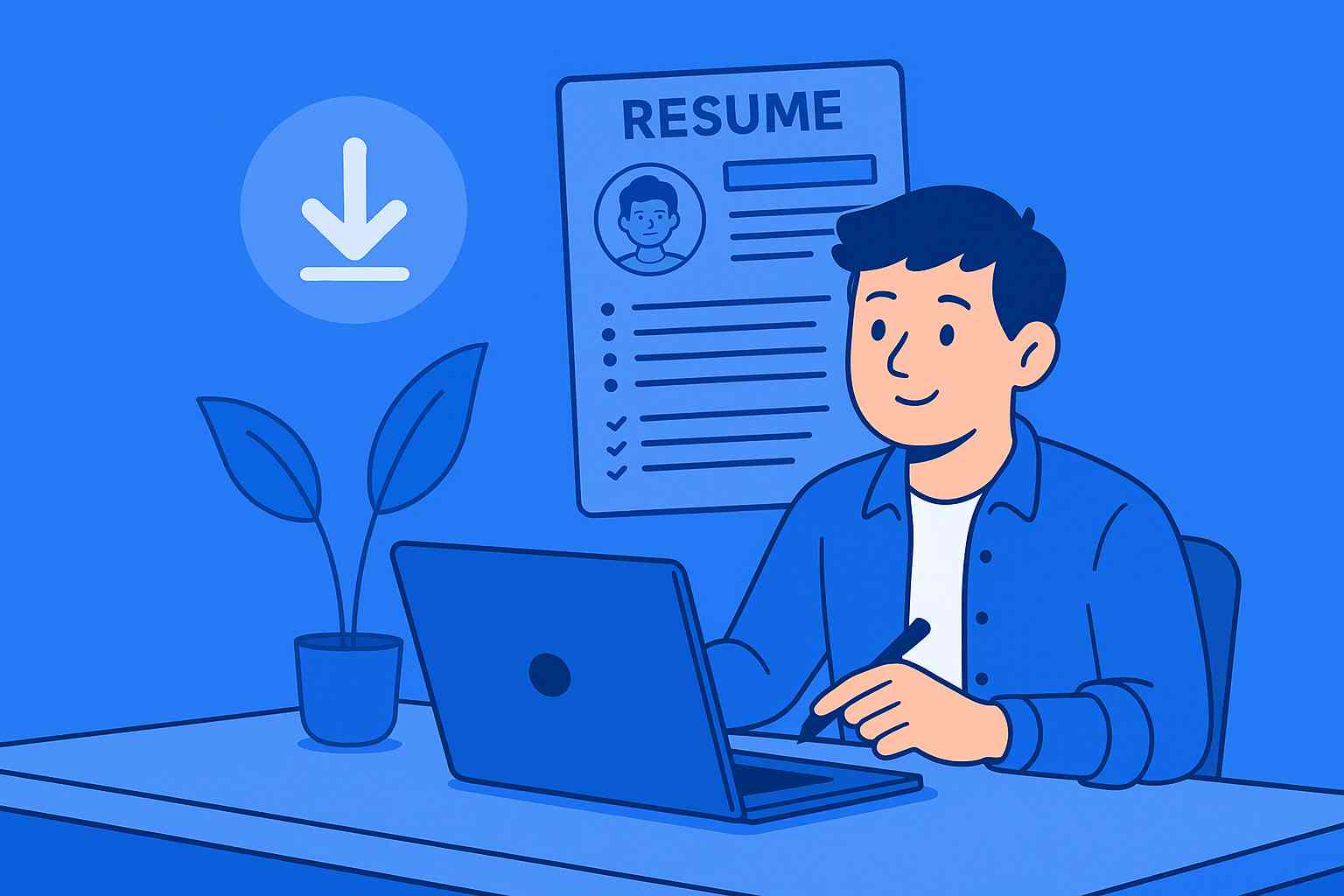Salary Negotiation for Fresh Graduates: Yes, You Can Do It!

Discover the top fresher jobs in tech for 2025. Explore emerging roles, in-demand skills, and how to land...

Learn about the top fresher jobs, skills required, and practical steps to land your first role.

Breaking into the fresher job market? Here's your complete guide to current hiring trends, sectors with high demand,...

Learn how to negotiate your first salary as a fresh graduate. Get tips on timing, confidence, research, and...

Learn how to succeed in job interviews as a fresh graduate. Includes common questions, preparation tips, and...

Learn how freshers can use LinkedIn to find their first job. Optimize your profile, build connections, and apply confidently.

Explore entry-level renewable energy jobs and green careers for freshers in India. Learn how to start a career in...

Download easy-to-edit resume templates for freshers. Learn how to customize your resume to apply for jobs, even with...

Explore the top healthcare jobs for freshers in medical technology, clinical support, and diagnostics. Learn how to...

Explore entry-level finance jobs for freshers, from analyst roles to banking. Learn the skills required, where to...

Learn how freshers can start a career in e-commerce. Explore entry-level roles, required skills, and growth paths in...

Discover practical job search strategies for freshers. Learn how to write better resumes, use job platforms, and...

Discover the best marketing jobs for freshers, how to get started with no experience, and what roles offer real...

Discover the top technical and soft skills every tech fresher should have to land their first job in the IT industry.

The Indian rupee dipped to 85.70/USD as investors await U.S. jobs data and a looming trade deal deadline, yet...

Ask these key self-reflection questions to define your goals, boost confidence, and land your dream job across any...

Learn how freshers can build a strong professional network from zero. Discover networking events, online platforms,...

Discover the top 10 in-demand fresher jobs for 2025. Find high-paying entry-level career opportunities with growth...

Step-by-step fresher resume writing guide with proven formats and examples. Build a professional CV that stands out...

Complete job hunt guide for freshers. Learn resume writing, interview tips, networking strategies, and job search...

Top fresher interview questions with sample answers and preparation tips. Master your first job interview with...
Resources
-

Set up personalized job alerts to receive notifications about new job openings that match your...
-

Find part-time job opportunities perfect for students, parents, and professionals seeking...
-

Work from home jobs across industries with flexible hours, competitive pay, and real career...
-

Create professional resumes with easy-to-use resume builders. Choose from templates, get...
-

Kickstart your career with internships tailored for students and graduates — explore paid,...
-

Remote jobs have revolutionized how we work, giving professionals the freedom to contribute from...
-

Find the best fresher jobs and entry-level opportunities across IT, Finance, Marketing, and...

You have just received your first job offer. Congratulations! That is a huge accomplishment and a moment worth celebrating.
Now comes the part that most fresh graduates avoid, or do not even think they are allowed to do: salary negotiation.
A wave of questions and anxieties might start to creep in: - “Will they think I am ungrateful and take back the offer?” - “What if I come off as being too greedy or arrogant?” - “Do fresh graduates even have the right to negotiate?”
Here is the truth that can change the course of your career: Yes, you can negotiate. And in many cases, you absolutely should.
Even if it is your first job and you have no prior experience, you can still have a professional and successful salary discussion. The key is knowing how to approach it smartly, respectfully, and with confidence.
In this guide, we will break down the entire process for you.
Why You Should Negotiate as a Fresher
Most people accept the very first salary they are offered in their first job, often out of fear or a lack of awareness. But here is what you might be missing if you do not negotiate.
Your Future Raises Start With Your Base Salary Your starting salary is the foundation upon which all your future earnings are built. Every future raise, bonus, and promotion will be calculated as a percentage of this base figure.
A 10% raise on a salary of ₹3.5 LPA is significantly smaller than a 10% raise on a salary of ₹4.5 LPA. By starting low, you are setting yourself up to earn less over the entire course of your career.
Companies Often Expect You to Negotiate Most experienced hiring managers and HR professionals build a small buffer into their initial salary offer. They often expect candidates to negotiate and have a range they can work within.
By not asking, you are frequently leaving money on the table that the company was already prepared to pay you.
Confidence Is a Highly Valued Trait When you negotiate politely and professionally, it demonstrates maturity, self-respect, and confidence. Employers do not see this as arrogance; they see it as a sign that you understand your value and are serious about your career.
In a competitive job market, this kind of professional confidence is a major plus.
If you are not sure what your role should pay, you can use the JobPe Salaries tool to research entry-level salaries across different roles, industries, and locations.
When Is the Right Time to Bring It Up?
Timing is everything in a negotiation. You should never start a conversation about salary during your first or even second interview. At that stage, the focus should be on proving your suitability for the role.
The right moment to negotiate is after the company has formally extended a job offer to you. Once they have decided they want to hire you, you have the most leverage.
So, when the hiring manager or HR representative says something like:
“We were very impressed with your interviews, and we would like to extend an offer to you for the position of...”
That is your cue. You can respond calmly and positively:
“Thank you so much! I am very excited about this opportunity. I would love to hear the details. Can we take a moment to discuss the compensation part of the offer?”
Keep your tone curious and conversational, not demanding.
What to Research Before You Negotiate
You will feel much more confident and sound much stronger if you have done your homework. Your "ask" should be based on data, not just on what you want.
1. Industry Salary Standards You need to know the average salary for your specific role, in your city, and at your experience level (entry-level). - Use tools like the JobPe Salaries page, Glassdoor, and AmbitionBox. - Look at 2-3 different sources to find a reliable salary range.
2. The Type of Company The size and type of the company will influence its pay structure. - Startups often offer lower base salaries but may compensate with learning opportunities or stock options. - Large corporations typically have higher salaries but may have more rigid, pre-defined pay bands. - Public sector jobs have fixed pay scales, while the private sector offers more flexibility.
3. The Specific Role Responsibilities Two jobs with the same title, like "Marketing Executive," can have very different responsibilities. - Carefully re-read the job description. - If the role requires you to handle tasks or use technical skills that are more advanced than a typical entry-level position, that is a valid reason to ask for a higher salary.
4. The Full Compensation Package A slightly lower salary might be acceptable if the company offers excellent benefits and perks. Always look at the total package, which may include: - Work-from-home options or flexible hours. - A budget for professional courses or paid certifications. - Performance-based bonuses. - Health insurance, meal allowances, or travel reimbursements.
How Much Should You Ask For?
As a fresher, a reasonable increase to ask for is typically between 10% and 20% of the initial offer. Your request should always be backed by the research you have done.
Example: The company offers you a salary of ₹3.6 LPA. Through your research, you have found that similar roles in your city typically pay between ₹4 LPA and ₹4.2 LPA.
You could politely say:
“Thank you again for the offer. Based on my research into the standard compensation for this role in our city, I was expecting a figure closer to the ₹4 LPA mark. Would you be open to discussing if there is any flexibility to meet that?”
This is a polite, reasonable, and data-backed request.
However, if the initial offer is already competitive and aligns with the higher end of the market average, it might be better to accept it graciously and focus on proving your value in the role.
What to Say (And What Not to Say)
The way you communicate during a negotiation is just as important as the numbers you discuss. Your tone should always be professional and respectful.
Phrases to Use: - “I am very excited about this offer and the opportunity to join your team.” (Always start with appreciation). - “Based on my research of the market rates for this role, I was hoping for a salary that is slightly more competitive.” - “Is there any flexibility on the proposed compensation?” - “I would love to discuss if there is any room to align this offer more closely with industry standards.”
Phrases to Avoid: - “I need more money because my rent is very high.” (Your personal expenses are not the employer's concern). - “My parents expect me to earn more than this.” - “Another company has offered me more, so you need to give me a better offer or I will walk away.” (This sounds like an ultimatum).
Always keep the conversation focused on your professional value and market data, not on your personal needs or other offers (unless you are prepared to lose this one).
Need help practicing your delivery? You can use JobPe Mock Interviews to rehearse your negotiation script and get better at sounding confident and natural.
What If They Say No?
Sometimes, a company may have a fixed budget for a role, or they may be hiring a large number of freshers with a standard, non-negotiable pay band.
If they say no to your request, do not get discouraged. You still have a few options.
1. Ask About Future Reviews You can say something like:
“I completely understand your position. Could we perhaps set a performance review in six months to revisit the compensation based on my contributions to the team?”
This shows that you are confident in your ability to deliver value.
2. Ask About Non-Salary Benefits If the base salary is fixed, perhaps they can be flexible with other parts of the package. You could ask about: - A learning stipend for online courses. - Additional paid leave days. - Reimbursements for your home internet or travel expenses.
3. Decide Based on the Full Picture Before you accept or reject the offer, take a step back and look at the entire opportunity. Ask yourself: - Will this role provide me with valuable experience and help me grow? - Will I learn new skills that will make me more marketable in the future? - Is the company culture healthy and supportive?
Sometimes, the experience and learning opportunities offered by a job are worth more than a small difference in your starting salary.
However, if the offer is significantly below the industry average and the company is unwilling to negotiate on any front, that could be a red flag. You can find better employers by Browse JobPe Companies, where company policies and benefits are often more transparent.
Salary Negotiation Myths You Should Ignore
Let’s bust a few common myths that hold freshers back from negotiating.
Myth 1: “I will lose the job offer if I try to negotiate.” This is highly unlikely. As long as you are polite, professional, and reasonable in your request, a company will not withdraw an offer. In fact, most recruiters respect candidates who know their worth.
Myth 2: “Only experienced professionals are allowed to negotiate.” This is not true. Many companies expect negotiation at all levels, including for entry-level roles.
Myth 3: “I do not have experience, so I have no basis to ask for more.” Your value is not just based on past job titles. If you have completed internships, built impressive projects, earned relevant certifications, or won academic competitions, you bring unique value to the table. This value deserves to be fairly compensated.
You can use the JobPe Resume Builder to showcase these achievements clearly on your resume, which will give you more leverage in salary discussions.
Your First Negotiation Is a Skill for Life
Not every offer needs to be negotiated. If it is a fair offer that aligns with your research, and the company provides excellent opportunities for learning and growth, you should feel confident in accepting it.
But if something feels off, or if the offer is lower than you expected, do not be afraid to have a polite and professional conversation. You only get one chance to negotiate your very first salary.
Remember, salary negotiation is not about being difficult or creating a conflict. It is about knowing your worth, communicating it confidently, and starting your career on the right foot.
